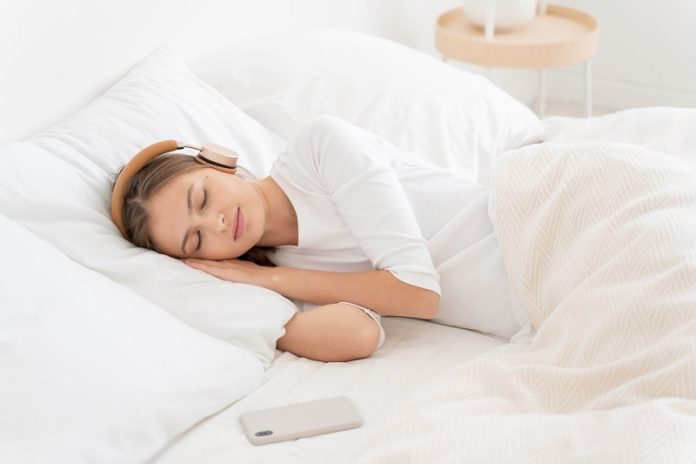
Sleep, especially the deep kind, is not just good for our minds but our hearts too! Researchers in Zurich have made a fascinating discovery that might pave the way for better heart health through sleep.
Let’s dive into how gentle sounds during deep sleep might be a small secret to a strong and happy heart.
Dreamy Tunes Boost Heart Function
A bunch of curious scientists at ETH Zurich and the University of Zurich have stumbled upon something exciting – playing brief, gentle tones (a bit like soft static noise) to people while they are in deep sleep can make their hearts work better!
Specifically, the left ventricle – an essential chamber in our heart that sends oxygen-rich blood to our organs, brain, and limbs – seems to give a more robust performance after these musical nudges during sleep.
It pumps blood more efficiently, which is like a mini workout for the cardiovascular system.
Imagine your heart like a sponge that squeezes water (or in this case, blood) in and out. The better the squeeze, the more blood it can push into circulation and ensure our body gets the oxygen and nutrients it needs.
So, by playing these gentle noises during deep sleep, where our brain and body are in rest and recovery mode, our heart gets a little extra boost in its pumping action!
The Experiment: Tuning into Heart Health
In a small but mighty experiment, 18 healthy men aged between 30 and 57 were observed over three nights in a sleep lab.
The team kept a close watch on their brain activity, blood pressure, and heart function while they slept.
On some nights, they played the special “pink noise” – a type of sound that’s known to enhance brain waves associated with deep sleep – and on others, they let them sleep in silence.
These brief sequences of sounds were played only when the men entered deep sleep, followed by periods of quiet. And what did they find?
When the sounds were played, not only did the men experience better deep sleep, but their heart’s left ventricle also showed more intense activity the following morning, meaning it was pumping blood more effectively.
All of this after just one night of sleep with those special tunes!
Potential Ripple Effects: From Athletes to Everyday Heart Care
The promise of this research isn’t just for those with heart conditions, but also athletes or anyone interested in maintaining or improving their cardiovascular health.
Imagine if improving heart function, and therefore recovery after exercise or even prevention of heart diseases, was as simple as enhancing our sleep with subtle, targeted sounds!
Stephanie Huwiler, one of the lead authors, presented these findings to sports cardiologists in Zurich in March 2023, sharing the potential of using such deep sleep stimulation for better cardiac function and post-workout recovery in the athletic world.
But it’s important to mention that these exciting findings are just the beginning. More research needs to be done, and the researchers are on it!
They’re seeking further funding and even starting a company, EARDREAM, to explore and develop this intriguing link between sound-stimulated sleep and cardiovascular health.
They’re hopeful to find even more powerful ways to positively influence our heart health while we sleep.
However, these initial studies focused only on men to keep the participant group as uniform as possible and to minimize potential variables like the menstrual cycle or menopause, which can affect sleep.
Future studies, as emphasized by the research team, must include women to truly understand the wide-reaching implications and applicability of these findings.
In the not-so-distant future, we may find ourselves not just counting sheep for a good night’s sleep, but also tuning into heart-healthy sleep rhythms for a stronger, happier heart!
If you care about sleep, please read studies about the science on 3 traditional bedtime remedies, and this sleep supplement may help prevent memory loss and cognitive decline.
For more information about sleep, please see recent studies that coffee boosts your physical activity, cuts sleep, affects heartbeat, and results showing how to deal with “COVID-somnia” and sleep well at night.
The research findings can be found in the European Heart Journal.
Follow us on Twitter for more articles about this topic.
Copyright © 2023 Knowridge Science Report. All rights reserved.



